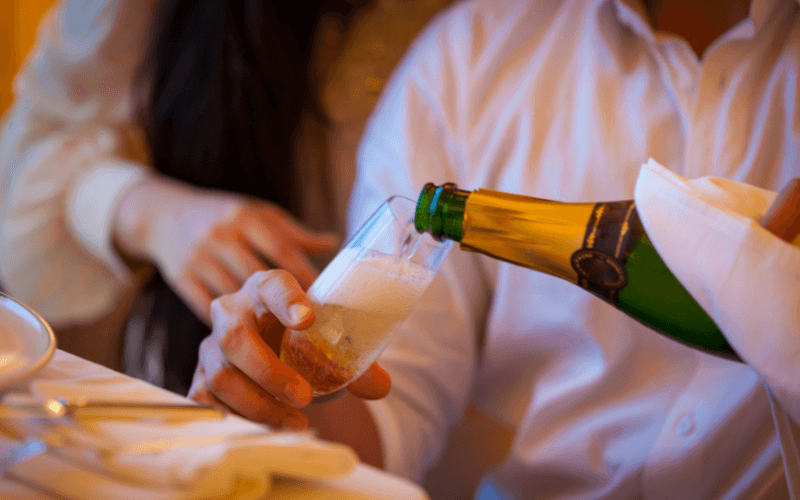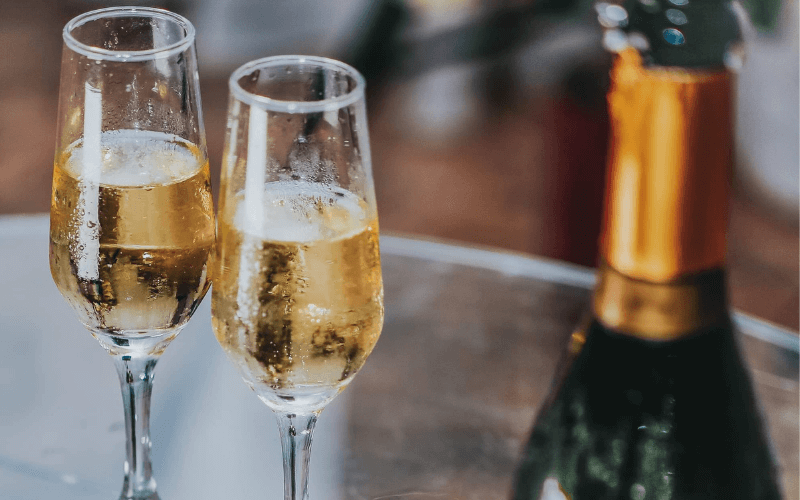
Shelf Life Basics: Understanding How Long Champagne Lasts


People usually drink Champagne to celebrate any special occasion, such as birthdays, weddings, and New Year's Eve. But, once you've opened a bottle and think if there will be some left, you ask yourself: how long does Champagne last?
When talking about the shelf life of Champagne, it is essential to know if the wine is vintage or not and whether it's opened or not. Generally, vintage Champagnes have a 5 to 10-year shelf life, while non-vintage ones can last for 3 to 4 years.
If you want to learn more about Champagne’s longevity and other useful information. Keep reading for more details!

Unlike red wines and some white wines, Champagne and other sparkling wines are best enjoyed immediately after purchase. This way, you get to enjoy the signature fizz and the delightful acidity.
However, if you plan on holding off your Champagne for a while, you can do so but note that there's a time limit. Furthermore, it depends on several factors, which will be further discussed below.

There are generally two types of Champagne according to the year of harvest: vintage and non-vintage.
The easiest way to determine whether a Champagne is vintage or non-vintage is by reading Champagne labels. If you see a year on the bottle, that means the wine is vintage. Otherwise, it is non-vintage.
For a bottle of Champagne to be called vintage, it must be produced from Champagne grapes harvested from the same year. Bottles of vintage Champagne are produced only in limited quantities, about 5% of the whole Champagne productions.
Their grapes are usually harvested in a single good year and from excellent vineyards, giving them higher quality. So, it's easy to see why this is considered the crème de la crème of Champagnes.
If stored correctly and left intact, vintages can retain their taste between 5 to 10 years. These are designed to age better than non-vintage ones, which is why they last longer. Other people even say that some vintage Champagnes can last for 20 years or more.
On the other hand, non-vintage Champagnes are made from blending grapes harvested from different years. Champagne houses and winemakers frequently curate non-vintage Champagnes with a specific goal in mind for how they want them to taste.
Non-vintage Champagnes do not have the reputation of being superior, but they are very accessible and offer many fantastic selections as well. In fact, the best cheap Champagnes can easily be anyone's go-to for any celebration.
These wines are estimated to have a shelf life of 3 to 4 years, given that you follow the correct storage instructions.

It's a no-brainer that an unopened Champagne would last longer than an opened one. Although, you also need to consider how your unopened bottles are stored as their shelf life is greatly affected by storage conditions.
If you store unopened Champagne inside your wine cellar or a wine refrigerator and away from light, then this will help maintain its quality longer than if left out on an exposed surface where sunrays can reach.
As mentioned above, an unopened bottle of vintage can last for up to 10 years, while a non-vintage can only last for about 5 years. However, certain vintage Champagnes can exceed the said lifespan as they are intended to be aged for years in the bottle before you should open them.
Once you open a bottle of Champagne, the air is introduced inside the bottle. If you don't pour all the Champagne in one sitting, its quality will slowly deteriorate.
Nevertheless, both vintage and non-vintage Champagnes can still be in decent condition for 3 to 5 days following their opening. Beyond this time, it may not be pleasant to drink the Champagne anymore.

Leftover Champagne is susceptible to spoiling, but how can one avoid this? The answer: storing Champagne properly!
If you decide to put a Champagne stopper on your bottle, the sparkling wine can still be good to drink for 3 to 5 days. This will prevent the CO2 from escaping the bottle and prevent the drink from going flat.
You can also reseal it using a red or white wine cork. Champagne corks are usually tapered, making them difficult to fit into the bottle. This is why still wine corks are recommended.
Conversely, if you'll just put a less secure covering for your bottle, say, plastic wrap, be sure to consume the leftover Champagne within two days at most. Furthermore, it's a good idea to keep the opened Champagne in the wine fridge to keep it cool. If unavailable, place it wherever it is dark, cool, with no sunlight.

Most alcoholic drinks can last for decades if they are unopened. But, once a bottle of alcohol is opened, it will also start to deteriorate. And with several factors like air exposure and storage, alcohol will eventually go bad.
Red wines and some white wines are known to become better when they age. But, Champagne doesn't improve its taste over time. Whether it's vintage or non-vintage, a Champagne will, unfortunately, go bad when the time comes.
Compared to most wines and liquors, Champagne is carbonated. Its fizz and bubbles are one of the reasons why people love it! However, it is also why they can't be aged or stored as long as other alcohols.
We already know that opening a bottle of Champagne and exposing it to oxygen means losing its fizz. However, oxygen isn't the only thing you're exposing the Champagne to when you open it.
You are also exposing it to bacteria! Some of them, known as acetic acid bacteria, can eat the alcohol away when they would come in contact with the Champagne.
They produce acetic acid and acetaldehyde, which give your opened Champagne the sharp smell that's reminiscent of vinegar.
To know if a Champagne has gone bad, you need to open and assess it yourself. Once that's done, there are several indicators you should see.
The first is the iconic pop you hear when you open a Champagne bottle. If you can't hear the pop, that could mean the Champagne has lost the carbonation.
Afterward, you should smell and see. If a sour aroma will envelop you, and you can see clumps forming and floating, that's a clear indication that the Champagne is already spoiled. Another sign is when the color has turned dark or brownish.
If that's not enough proof for you, you can resort to tasting the liquid. If you can taste nothing but sourness, similar to vinegar, then it's already gone bad.
As unhealthy as it sounds, drinking spoiled, flat Champagne won't poison you. You have nothing to worry about if you accidentally consume some. The only thing it'll give you is dissatisfaction because of the experience.
If you're curious about what bad Champagne tastes like, you can take a small sip. Avoid consuming a lot of it because it may contain microbes if improperly stored.
Many people would rather throw away their old bottles and favor new ones because they lose bubbles, develop off aromas, and sour taste.
You can age or mature Champagne for a short period since it already had its aging before it's sold. However, the result isn't assured; it could either go well, just the same, or bad.
Some factors that could affect the aging process are your Champagne's quality and how you store Champagne.
Vintage champagnes and prestige cuvées are said to do well with aging instead of non-vintage Champagnes. However, even the most expensive vintage bottle or cuvée could still lose its carbonation after decades of aging, and you'll also see changes in its color.
There is also a possibility that the Champagne won't have the same taste or flavor that it originally had. It may lose its carbonation but develop more complex and quite different flavors. Few people or perhaps no one would risk a long time to change Champagne most of the time.
Still, whether the taste of the aged Champagne is likable or not is solely up to the drinker. Different preferences mean different opinions.
Sparkling wines from the Champagne region of France are made using the traditional method. Other bubbly such as Prosecco, are made using the tank method, which produces subtle or less intense bubbles than Champagne.
Prosecco and other sparkling wines not made using the traditional method typically have a shorter shelf life than Champagne. Unopened bottles can last three years at most from the time of their bottling.
If opened, it's best to consume all the sparkling wine the same day you purchased it. With a wine stopper or a Champagne sealer, you can save some leftovers but only up to one day.
To wrap things up, here's a table of the longevity of Champagne based on its type and storage condition:
|
Vintage |
Non-vintage |
|
|
Unopened |
5 - 10 years |
3 - 4 years |
|
Opened |
3 - 5 days (with stopper) 1- 2 days (Without stopper) |
|
Champagne is one of life's most luxurious indulgences. Understandably, many people want to make sure they're getting the most out of their purchase. That's why it's important to be aware of how long it lasts and the reason behind it.
Did you find this article helpful? Feel free to leave your comments below and share your knowledge about Champagne’s shelf life if ever we missed some information.